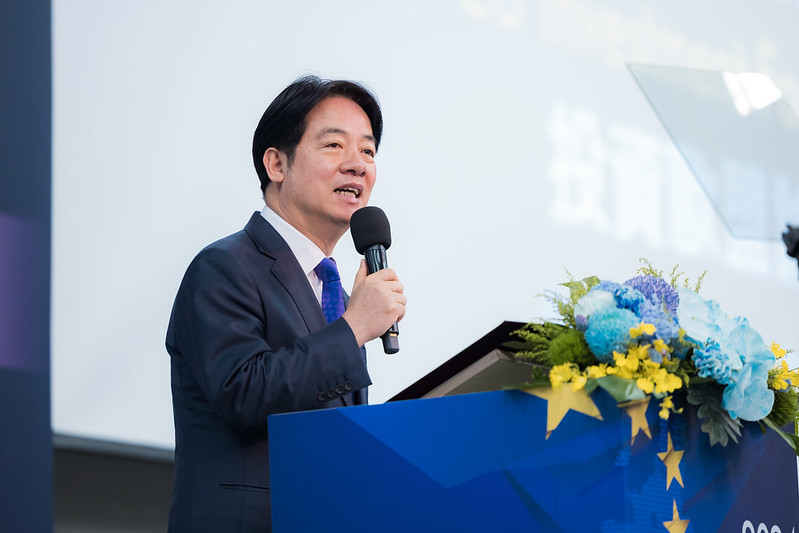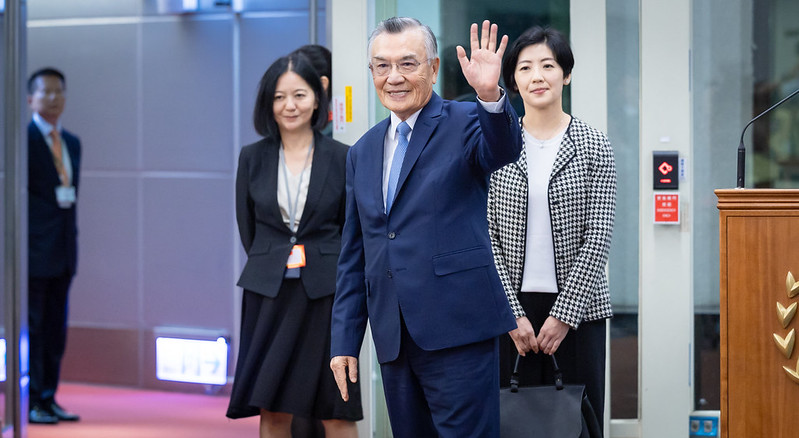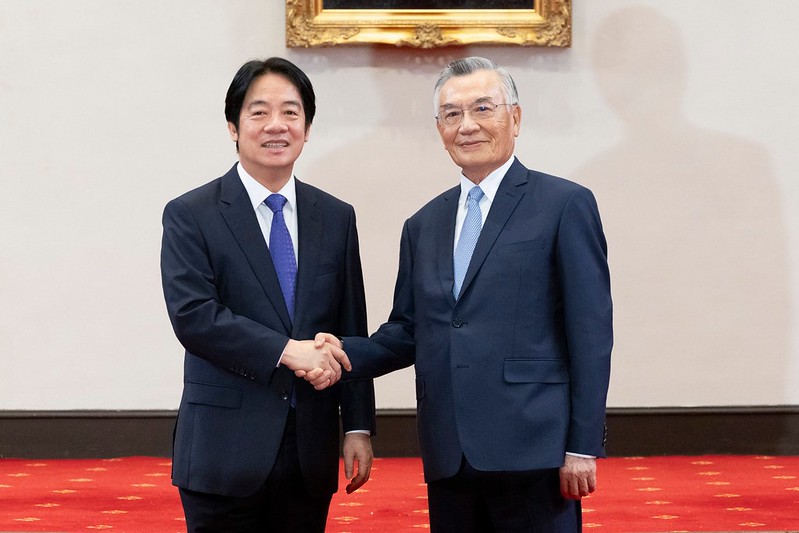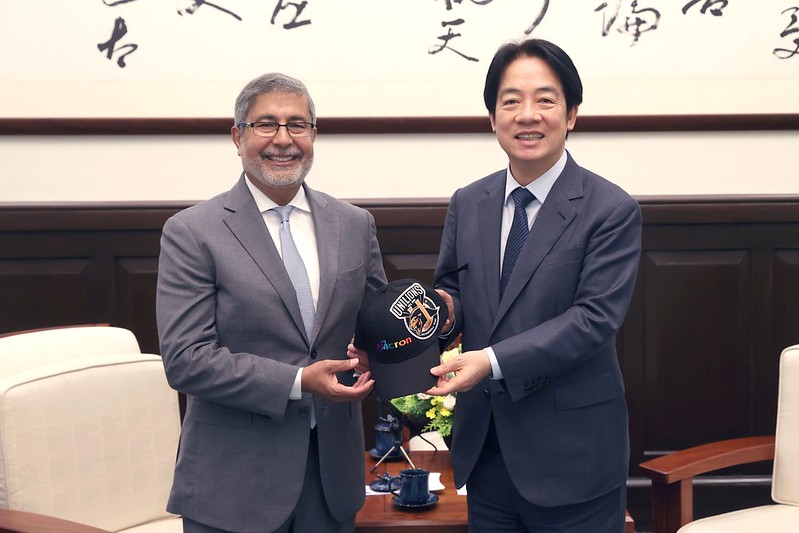News & activities
 News releases
News releases
2016-10-05
President Tsai appoints James Soong as her envoy at 2016 APEC Economic Leaders' Meeting
With the APEC Economic Leaders' Meeting (AELM) scheduled to take place in November in Lima, Peru, Presidential Office Spokesperson Huang Chung-yen (黃重諺) announced that President Tsai Ing-wen has decided to appoint Mr. James Soong (宋楚瑜, Chairman of the People First Party) as the Leader's Representative for Taiwan at the event.
Chairman Soong has a strong academic background and abundant experience. Having served in the past as director general of the Government Information Office and governor of Taiwan Province, he has a deep understanding of political and economic conditions in Taiwan, is well-versed in international affairs, and has made outstanding contributions to regional development. President Tsai feels that Chairman Soong, with his solid academic training, rich experience, and extensive network of personal ties, is well qualified to provide the international community with an accurate and comprehensive picture of the current state of development in Taiwan, and will certainly be able to substantively enhance Taiwan's influence in the APEC and its interactions with individual APEC members. These are the reasons for Chairman Soong's appointment as the Leader's Representative for Taiwan at the AELM. Chairman Soong will take part in the APEC meetings together with his daughter Ms. Soong Cheng-mai (宋鎮邁).
Taiwan is in complete agreement with the theme of APEC 2016—Quality Growth and Human Development—and supports the four APEC 2016 priorities: Advancing Regional Economic Integration, Enhancing the Regional Food Market, Working on the Modernization of Micro, Small, and Medium Enterprises (MSMEs), and Developing Human Capital. Working within the APEC framework, Taiwan has cooperated closely year after year with other APEC members on such issues as food security, small and medium enterprises, and human resources.
Taiwan has supported APEC initiatives and programs ever since becoming an APEC member in 1991. Just this past August 25, for example, after Taiwan donated US$500,000 to the APEC Support Fund (ASF), the APEC Secretariat issued a news release to thank Taiwan for our support and contributions to the APEC family. Taiwan will continue participating actively in order to enhance cooperation and exchanges with other APEC members, and to act as an innovator, a sharer, and a server of others in the process of regional economic and trade development.
Chairman Soong has a strong academic background and abundant experience. Having served in the past as director general of the Government Information Office and governor of Taiwan Province, he has a deep understanding of political and economic conditions in Taiwan, is well-versed in international affairs, and has made outstanding contributions to regional development. President Tsai feels that Chairman Soong, with his solid academic training, rich experience, and extensive network of personal ties, is well qualified to provide the international community with an accurate and comprehensive picture of the current state of development in Taiwan, and will certainly be able to substantively enhance Taiwan's influence in the APEC and its interactions with individual APEC members. These are the reasons for Chairman Soong's appointment as the Leader's Representative for Taiwan at the AELM. Chairman Soong will take part in the APEC meetings together with his daughter Ms. Soong Cheng-mai (宋鎮邁).
Taiwan is in complete agreement with the theme of APEC 2016—Quality Growth and Human Development—and supports the four APEC 2016 priorities: Advancing Regional Economic Integration, Enhancing the Regional Food Market, Working on the Modernization of Micro, Small, and Medium Enterprises (MSMEs), and Developing Human Capital. Working within the APEC framework, Taiwan has cooperated closely year after year with other APEC members on such issues as food security, small and medium enterprises, and human resources.
Taiwan has supported APEC initiatives and programs ever since becoming an APEC member in 1991. Just this past August 25, for example, after Taiwan donated US$500,000 to the APEC Support Fund (ASF), the APEC Secretariat issued a news release to thank Taiwan for our support and contributions to the APEC family. Taiwan will continue participating actively in order to enhance cooperation and exchanges with other APEC members, and to act as an innovator, a sharer, and a server of others in the process of regional economic and trade development.
Related News

2025-04-10
President Lai pens Bloomberg News article on Taiwan’s response to US reciprocal tariffs
On April 10, an article penned by President Lai Ching-te entitled “Taiwan Has a Roadmap for Deeper US Trade Ties” was published ...

2024-11-18
President Lai attends 2024 EU Investment Forum
On the afternoon of November 18, President Lai Ching-te attended the opening of the 2024 European Union Investment Forum. In remarks at the ...

2024-11-12
APEC envoy Lin Hsin-i delivers remarks before departing for 2024 APEC Economic Leaders’ Meeting
On the evening of November 12, ahead of his departure for Peru to attend the 2024 APEC Economic Leaders’ Meeting (AELM) from November ...

2024-11-07
President Lai attends press conference before Taiwan’s delegation departs for 2024 APEC Economic Leaders’ Meeting
On the morning of November 7, President Lai Ching-te attended a press conference before Taiwan’s delegation departs for the 2024 APEC ...

2024-07-12
President Lai meets Micron Technology delegation
On the morning of July 12, President Lai Ching-te met with a delegation from Micron Technology. In remarks, President Lai thanked Micron for...



